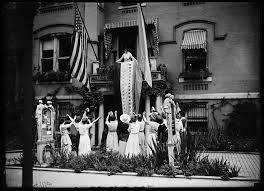On August 26, 1920, a historic moment occurred in the United States that forever changed the landscape of democracy and women's rights. On this day, the 19th Amendment to the U.S. Constitution was officially certified, granting women the right to vote.
The road to achieving women's suffrage was a long and arduous one. The suffrage movement had been active for decades, with women across the country fighting tirelessly for their right to participate in the democratic process. Led by prominent suffragists such as Susan B. Anthony and Elizabeth Cady Stanton, women organized protests, marches, and campaigns to raise awareness and advocate for their cause.
The 19th Amendment, also known as the Susan B. Anthony Amendment, was first introduced to Congress in 1878. However, it faced considerable opposition and challenges along the way. It took years of relentless advocacy, lobbying, and public pressure for the amendment to gain the necessary support and eventually be ratified.
On August 26, 1920, Secretary of State Bainbridge Colby signed the certification, officially enshrining the 19th Amendment into law. The amendment stated, "The right of citizens of the United States to vote shall not be denied or abridged by the United States or by any State on account of sex."
The ratification of the 19th Amendment was a significant victory for women's rights and a milestone in the fight for gender equality. It marked the culmination of years of perseverance and dedication by suffragists and their allies, who had tirelessly campaigned for women's suffrage.
The 19th Amendment had profound implications for American society. It granted women the right to participate fully in the democratic process, giving them a voice in electing their representatives and shaping the policies that affected their lives. It recognized the inherent equality of women and affirmed their status as full citizens of the United States.
The amendment also had far-reaching social and political consequences. It paved the way for women to enter the political arena, both as voters and as candidates for public office. Women began to take on leadership roles and make their mark in areas traditionally dominated by men. The 19th Amendment opened doors and shattered barriers, inspiring future generations of women to pursue their ambitions and fight for their rights.
However, it is important to note that the 19th Amendment did not guarantee universal suffrage for all women. Barriers such as racial discrimination and voter suppression continued to disproportionately affect women of color, particularly Black women, for many years. The fight for equal voting rights for all women continued long after the ratification of the 19th Amendment.
Nevertheless, the certification of the 19th Amendment on August 26, 1920, remains a significant moment in American history. It symbolizes the triumph of democracy, equality, and the power of collective action. The amendment continues to be a reminder of the progress made in the pursuit of gender equality and serves as a call to continue the work towards ensuring equal rights and opportunities for all.






